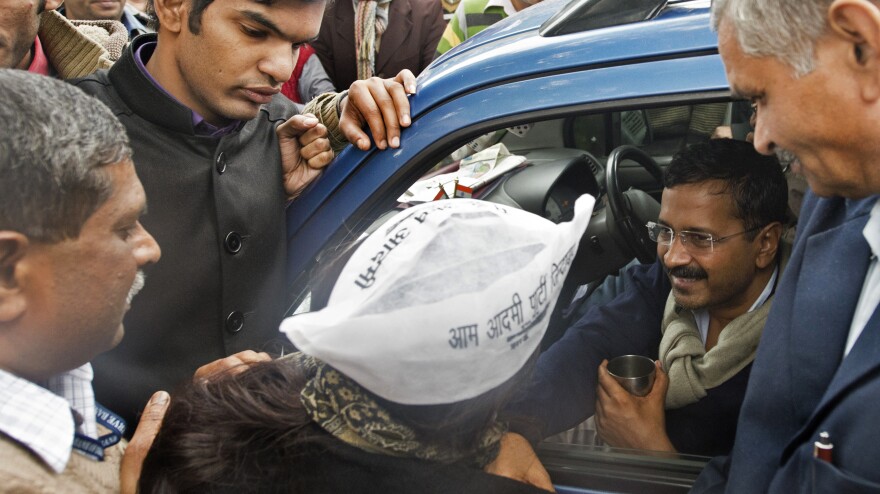In New Delhi an unprecedented two-day sit-in that pitted the local government against the national authorities has come to an end following altercations between police and protesters.
Some 30 people were injured during the demonstration that was led by newly elected Delhi Chief Minister Arvind Kejriwal, the local administrator who rallied members of his Aam Aadmi Party, named for the "Common Man," against the central government.
The violence in the nerve center of Delhi put in the cross-hairs Kejriwal's three-week old administration, which rode to power in December using a broom as its symbol. Kejriwal literally ran the city from the pavement in the course of the sit-in, prompting detractors to declare the new anti-corruption party as more "agitator" than "governor."
The Times of India reported that Kejriwal's blue wagon, dubbed the "AAPmobile" for the party's acronym, rode to notoriety and doubled as local government headquarters during the protest that began Monday.
The sit-in ended abruptly Tuesday night with a stitched-together deal that's been called more of a climb-down than a compromise. The subject of the protest was the New Delhi police, a much maligned force that many of the city's residents want overhauled.
Tapping into local anger, Kejriwal had demanded that the national government discipline the police force, which it controls. Kejriwal's administration had accused four officers — including officers in charge of the area where a Dutch tourist was gang-raped last week — of dereliction of duty and wanted them suspended from the force.
The stalemate ended when the central government put two officers on paid leave. There is likely to be no movement on the local chief minister's demand that his administration be put in control of the local police. That reportedly requires an amendment to the constitution, a long drawn-out affair.
Kejriwal nonetheless declared the action against the two officers a "victory" for the citizens of New Delhi, where public outrage at police erupted following the brutal gang-rape and murder of a 23-year old-student in 2012, a crime that generated international outrage.
As he called off the protest Tuesday night, Kejriwal warned that he will take to the streets again over issues related to women's safety.
But Delhites are not likely to support a repeat performance.
While residents want more effective policing and safer streets, many viewed the sit-in as a source of irritation and inconvenience. Although it was national government officials who shut the subways and disrupted traffic in an apparent bid to contain the protest, it was local administrators who earned the public's wrath.
In an editorial Wednesday, The Asian Age wrote: "Was AAP putting forward a model of controlled lawlessness. ... This is hardly the way of swaraj [self-rule] which Mahatma Gandhi had espoused and to which Mr. Kerjewal appears content to pay lip service."
Copyright 2020 NPR. To see more, visit https://www.npr.org.



